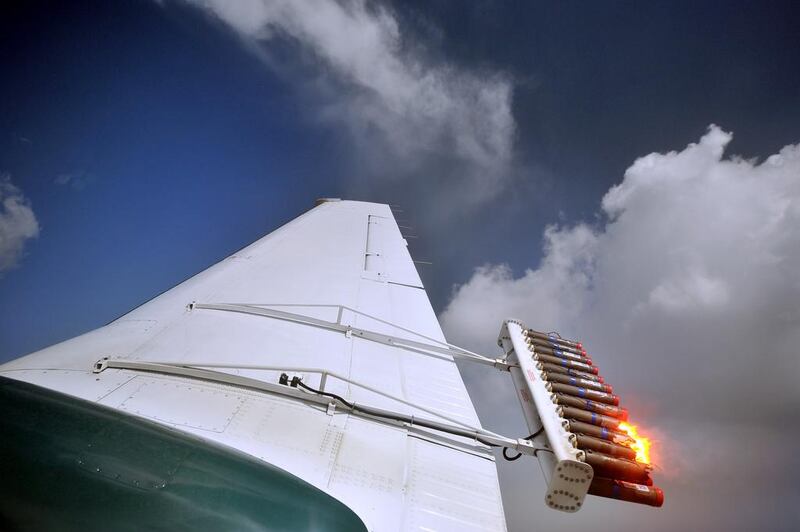Innovation is a key component of economic growth, development and global leadership. As countries seek to reach the top, there is a new demand to share their knowledge, resources and expertise to build a more sustainable world. This trend of international scientific convergence offers an opportunity for even greater returns on investment.
In this context, research and development is instrumental in driving progress, and constitutes the foundation of a strong knowledge-based economy, as demonstrated by the long and sustained investments of advanced nations: for the past few years for instance, Japan, China and India have led the way, together accounting for 36 per cent of the world’s expenditure in this field, followed by the United States with 29 per cent.
Japan invested more than 3 per cent of its annual GDP, while South Korea was up to 4.4 per cent. In the UAE, the annual investment in innovation is worth Dh14 billion, of which Dh7 billion goes to R & D.
With a focus on innovation, the UAE is building a vibrant and diversified national economy that will secure the country’s achievements in a post-hydrocarbon era.
Innovation is at the heart of the country’s diversification and growth strategy and the leadership is driving rain enhancement research as part of these objectives.
Due to its arid nature, this country has always been concerned by the issue of water security, leading the Government to devise strategies to put sustainability at the core of its economic development. The country acted decisively to boost its science and technology ecosystem by building up its research capacities while strengthening its ties with leading scientific institutions across the world.
One of the most significant initiatives is the national innovation strategy, aimed at transforming the country into one of the most innovative countries in the world in less than a decade. Its goal is to stimulate seven sectors where innovation is key to excellence – such as renewable energy, transport, education, health, technology, space and water – through new legislation, innovation incubators, investments in specialised skills and private-sector incentives.
Launched last year, the research programme for rain enhancement science has been put in place precisely to meet the pressing challenges of water security, directly addressing one of the key pillars of the national innovation strategy.
By promoting this sector of research, combined with investments in new technologies, efficient resource conservation and effective international partnerships, this country is driving innovative research throughout the whole field of water conservation and management.
The original cloud-seeding programme was initiated in the late 1990s and developed through cooperation between the UAE’s National Centre of Meteorology and Seismology and leading international organisations such as the National Center for Atmospheric Research in Colorado and the US space agency, Nasa.
Today, with 60 automatic weather stations, an integrated radar network and six dedicated aircraft taking off 200 times a year to seed the clouds and augment rain, the UAE is gearing up its effort. Thanks to this world-class infrastructure and constant capacity-building, the research programme for rain enhancement science successfully revived a field of research that had been dormant for half a century.
Throughout 2015, the programme reached out to leading international research institutions and organisations in the world, from Tokyo to San Francisco and Seoul to Bangkok, drawing international interest on our efforts and achievements.
This follows the guidance of Sheikh Mohammed bin Zayed, Crown Prince of Abu Dhabi and Deputy Supreme Commander of the UAE Armed Forces, who declared: “The future with its needs and challenges calls upon us to embark on a perpetual quest for alternative sources of energy and this can only be done through the support of relevant scientific research.” To bolster this, the UAE has been pursuing the advancement of science and technology and the consolidation of its research ecosystem by forging high-level partnerships as well as encouraging research projects globally.
The programme awards ceremony tomorrow will be a culmination of these efforts. The rigorous and intensive evaluation process and the quality of the winning proposals clearly demonstrate our country’s determination to place innovation and creativity at the heart of the nation’s vision of a common, prosperous future.
The second cycle of the programme, to be launched at the end of the ceremony, will offer even more opportunities for research teams across the globe to submit their projects to a pool of high-level reviewers, win the chance to receive a $5 million (Dh18m) grant, and help advance the cause of rain enhancement science. Together, let us take this journey of international collaboration and astounding discoveries one step further, towards sustainability and progress.
Alya Saeed Al Mazrouei is director of the UAE research programme for rain enhancement science at the National Centre of Meteorology and Seismology





